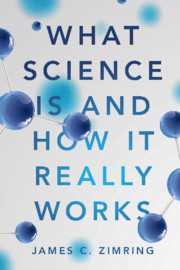
Immunologist James C. Zimring, author of What Science Is and How It Really Works (Cambridge, 2019), asks whether science should fight back against post-science relativism by claiming to know the Truth:
So, what really strains credulity more? To insist that we know that electrons, atoms, black holes, and dark matter are real because of how many observations we can explain and predictions we can make by positing their existence? Or to simply admit that science cannot support a claim of absolute truth regarding the abstract, unobserved scientific objects and laws that are posited to govern this world?
One could argue that we live in a time of sound bites and simplicity that cannot tolerate nuanced thinking. If scientists don’t bang the gong of “truth,” then it may only hasten the dismissal of science as just another opinion. However, I would argue that this position does not give the intended audience enough credit, and that claiming absolute truth ultimately does more harm than good, not only for the interface of science with the public, but for the practice of science. If data are sacrosanct to the sciences, then let us embrace the historical data on science itself.
James C. Zimring, “Opinion: The Uncomfortable Limits of Human Knowledge” at The Scientist
As it happens, the loss of theism puts science in an impossible position. A traditional monotheist (and probably most deists) would assume that God creates according to logic and reason and that the scientist can indeed find out the truth by “thinking God’s thoughts after him.” Some theists see science as a form of worship in that sense.
Take theism out of it and you have Darwin mistrusting his own theories because his mind was not essentially different from that of a monkey’s mind in a meaningless world. There is no escaping that dilemma.
It leads directly to the current demands that science credentials and acknowledgements be apportioned on the basis of fairness as if they were public goods of some kind. That’s reasonable if you assume that the truths that science pioneers were supposed to have discovered don’t really exist. It’s all just prejudice.
And the conflict can only get more intense from here.
See also: Would Hooker, Boyle, Pascal, and Newton would all be out of work today? The original main reason that science was so largely the preserve, for centuries, of well-to-do European men (many of whom were clergy or religious brothers) is circumstantial: They were available in considerable numbers in the right places at the right time.